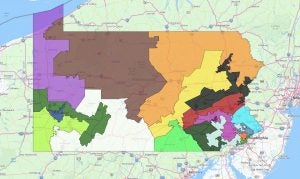UPDATE: Pa. Supreme Court Justices defend themselves against conflict claims in gerrymandering lawsuit

Pennsylvania State Capitol in Harrisburg. (WITF)
Responding to charges of bias in the state gerrymandering lawsuit, Pennsylvania Supreme Court Justice Christine Donohue and David Wecht defended their involvement in the case in filings that posted Monday.
“I never made any pledges, promises or commitments other than to faithfully apply the law,” Donohue wrote.
Last week, top GOP lawmakers demanded Donahue, who was elected as a Democrat, to disclose more about her possible ethical conflicts in ruling that declared the state’s congressional map unconstitutional.
Donohue already alerted the court in January to getting support from a lawyer representing Lt. Gov. Mike Stack during her campaign. But Republicans say her statement that “gerrymandering will end” to League of Women Voters during a 2015 campaign event signals a potential conflict of interest in the case.
Donohue says the closest she came to talking about redistricting was speaking about the court’s duty to appoint the fifth member of the reapportionment commission that’s in charge of drawing state legislative boundaries in the event that lawmakers can’t agree. That body has nothing to do with congressional boundaries, which were the only type at issue in the recent decision.
Donohue also denied the defendants’ request for a public hearing on the matter, as did Justice David Wecht.
The GOP wanted Wecht, also a Democrat, disqualified from the redistricting case. Based on his campaign trail comments, they say recent rulings, including the one overturning the map, should be vacated.
Wecht filed his 20-page response late Monday. In it, he said Republicans waited two weeks after the hearing to start looking into his prior statements, which doesn’t meet the “as early as possible standard” under state law.
Wecht wrote that defendants also “cherry-picked and curated from among thousands of statements made over the course of his “dizzying and unprecedented campaign” to exclude his repeated emphasis that he didn’t know how he’d rule on any given map and would do so based on law and facts involved in each case.
The justice stressed that giving his opinion on a topic is “manifestly distinct from a clear commitment to rule a certain way.”
Justice Sallie Mundy also filed a disclosure on Monday that she got $6,000 from Philadelphia-based law firm Obermayer Rebmann Maxwell & Hippel. Mundy’s initial filing on Monday stated she received $1,000 from the firm and $5,000 attorney Lawrence J. Tabas. He’s represented congressional candidates who advocated against changing the map due to the detrimental impact it could have on their campaigning efforts.
It’s unclear why Mundy — a Republican who was appointed by Gov. Wolf to finish out the term of former Justice Michael Eakin and won election to a full term last year — hadn’t disclosed the donations previously.
In October, Justice Debra Todd disclosed that she received nearly $11,000 in donations from law firms and attorneys involved in the case during her ultimately successful run for another term on the bench.
The ethics complaints may be the GOP’s last best effort to prevent the drawing of a new congressional map ahead of the 2018 midterm elections. Republican leaders had hoped for federal intervention, but on Monday the U.S. Supreme Court denied Republicans’ request to grant a stay in the case.
Editor’s note: This post has been updated to reflect that Wecht filed his response. It was originally published under the headline: “Pa. Supreme Court Justice Donahue defends conflict claims in gerrymandering lawsuit; Wecht still silent”
WHYY is your source for fact-based, in-depth journalism and information. As a nonprofit organization, we rely on financial support from readers like you. Please give today.







